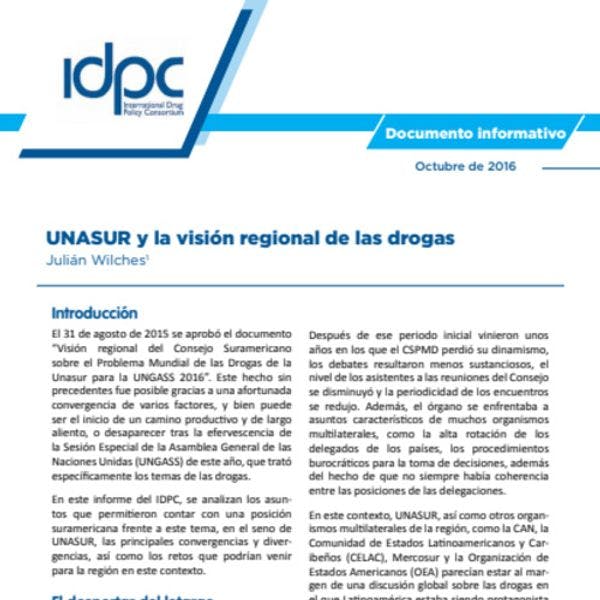L'UNASUR et la vision régionale sur les drogues
Dans ce rapport de l'IDPC, Julián Wilches analyse les facteurs qui ont permis la formation d'une prise de position sud-américaine vers l'UNGASS de 2016 et les défis pour sa perpétuation. Pour en savoir plus, en anglais, veuillez lire les informations ci-dessous.
Abonnez-vous à l'Alerte mensuelle de l'IDPC pour recevoir des informations relatives à la politique des drogues.
UNASUR’s South American Council on the World Drug Problem (CSPMD in Spanish) was created in 2010 and achieved some progress in approving its statutes and devising a plan of action. It initially carried out periodic activities and was active in certain debates, in particular those related to the issues tackled by its working groups. These discussions did not differ much from those taking place within bodies such as the Inter-American Drug Abuse Control Commission (CICAD) or the Andean Community of Nations (CAN).
In the years that followed, the CSPMD lost its dynamism – debates became less substantive, officials attending the Council’s meetings were increasingly junior, and gatherings were held less frequently. In addition, the body faced some of the issues that are characteristic of many multilateral entities: high turnover rates among country delegates, bureaucratic procedures for decision making, and the fact that the delegations’ positions were not always coherent.
In this context, UNASUR (along with other multilateral bodies in the region – such as CAN, the Community of Latin American and Caribbean States (CELAC), MERCOSUR and the Organization of American States (OAS)) appeared to be on the side-lines of the global discussion about drugs in which Latin America was a protagonist. Latin America’s central role in the debate required that discussions be held to establish positions that would recognise country diversity, focus on strengthening existing points of agreement and reflect upon the remaining differences.
Keep up-to-date with drug policy developments by subscribing to the IDPC Monthly Alert.
Téléchargements
Sujets
- Conventions de l'ONU sur les drogues
- Marchés des drogues réglementés
- Prisons et incarcération
- Violence liée aux drogues
- Réforme des lois sur les drogues
- Traitement de la dépendance à la drogue
- Décriminalisation
- Moyens de subsistence alternatifs
- UNGASS de 2016
- Droits humains et justice sociale
- Santé et réduction des risques
- Décriminalisation, réglementation et réforme
- Développement et environnement
Régions
Profils associés
- International Drug Policy Consortium (IDPC)
